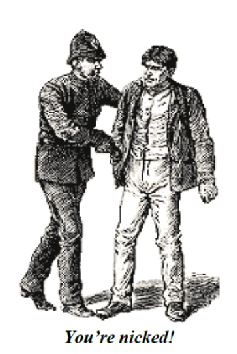




Crime and punishment!
In another of our occasional series harking back to life in the village during the Victorian period, we look at some instances of crimes that took place and how the offenders were dealt with.
In an era when life could be very hard for many ordinary villagers, there were always a few individuals who were drawn into a life of crime. Mostly it was petty theft, sometimes simply out of desperation, although in a few cases, as described below, it extended to stealing cloth from the village mills. This was a valuable commodity and any loss hit mill owners and workers alike. It’s surprising what lengths mill owners and their workforce went to in order to apprehend the miscreants. When caught, offenders could be sure of a harsh punishment. Now, read on…
Eastington Parish Magazine, November 1893
“Well John, when we last met you were talking of the late Mr Hooper and of his energy in putting down those mill burglaries. Didn’t he once lay hold of a notorious thief very early in the morning?”
“Ah, that was Bird; he was a notorious fellow, and no mistake. Yes, that was one morning, when he had broken into Millend Mill in the night, and then lay down to rest among the soft wool and overslept himself. Mr Hooper happened to be early at the counting-
“I expect that put a stop to such troubles for some time?”
“Well yes, of course, so far as Bird was concerned; but there were others, the Merretts, I remember, and it took a little while before such robberies quite came to an end.
I well remember one evening I had been to Whitminster to see my sister off by coach, when two men overtook me and entered into conversation. I found out they had come out of Gloucester Goal, and could tell me of two prisoners they had left there, convicted of stealing cloth at Eastington. They said they could tell me where the cloth was hid, from what they had heard. I asked them if they would tell it before my master. They said they would. I went straight to Mr Hooper’s house at Alkerton and told him. Him and me walked to Cambridge that same night and the found the men at the Lion. They told Mr Hooper it was hid in Grove Leaze. Search was made the next day, but I can’t clearly remember whether it was found.
Perhaps you can remember, sir, the remains of a decayed piece of fine cloth being found by the gardener behind the kitchen garden wall at Eastington House some thirty years ago or more?”
“Yes, that I can John; just part of the lists were left to show what it had been. That was perhaps the very last attempt, and did the thief no good. Let us hope better principles will prevent such things ever happening again”.
Eastington Parish Magazine, September 1893
“I fancy, John, your memory takes you back to a time when our parish
was not as honest and peaceable as it is now?”
“Ah yes, sir, some sixty years or so there were some notorious characters about, and the cloth made at the mills being a very high price, there were many attempts made to steal it”.
“And wasn’t there some place down by the Severn where such plunder was received and made away with?”
“Yes, so you mean old Master Brinkworth. Yes, his house was like a rabbit warren for places to conceal things, and then vessels passing gave him a good chance to get rid of them. The clothing [cloth making] was then carried on by Messrs. Hicks Brothers. I well remember two lots that was stole. The first was, I think, from Churchend Mill. It was two pieces of black broadcloth. They were taken up to Alkerton Farm, then in the occupation of old Joseph Burley, who had the barn full of corn.

When the corn came to be threshed out, the cloth was found. I saw, to my surprise, two farmhouse men carrying down a piece of black cloth each, rolled up in an unfinished state. On enquiry, we was told that they had just found it in the barn under the corn. There was two notorious characters who was judged of the affair, but no one could prove it. Soon after, they was convicted at Gloucester for housebreaking at Frampton and sentenced to seven years transportation.
t was not very long after before there was a robbery at Millend Mill, a blue cloth, stolen from the brusher shop occupied by James Howell and Thomas Richards, which was hidden in the old oak tree now standing at the top of the Great Ham. It was taken from there off to Birmingham and sold. At the time, there was one Job Andrews, constable of the parish. He was at once despatched off to Birmingham by stage coach, and met the two young gents with the spoils in their pockets. The coachman pulled up the horses and lent the constable a chain, who immediately chained them both together, then took them back to Birmingham, well secured them, and brought them home here. They were then committed to Gloucester Assizes for trial. One of them was transported for seven years and one was acquitted. “
“Did this sort of thing go on long, John?”
“Well yes sir, some years. In October 1832, the late Mr Hooper [Charles Hooper, mill owner of the time] took to the business, and several robberies took place, but he was very determined in putting it down.”
By Stephen Mills
Published in ECN 138 April/May 2013
Eastington Parish Magazine in the 1880s

